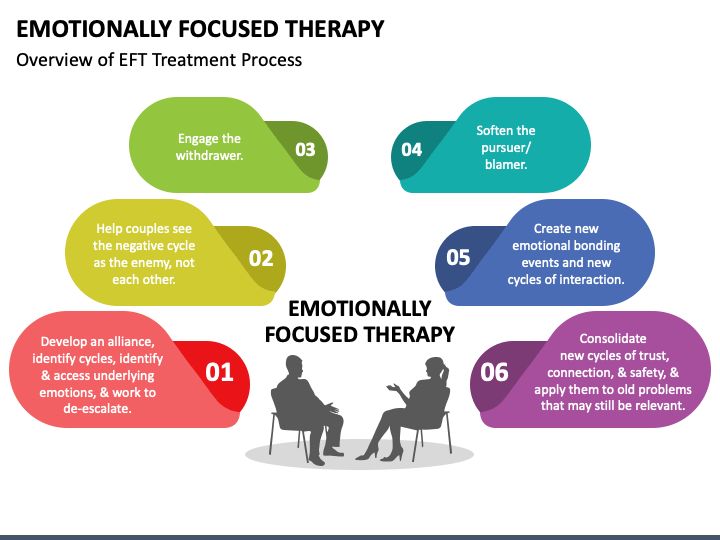If you’re feeling overwhelmed, stressed, or anxious regularly and traditional talk therapy hasn’t been providing the relief you need. Then it might be time to consider emotional-focused therapy. In this article, we’ll explore what EFT is, who it can help, how it works, and why you might want to consider giving it a try.
Contents
Understanding EFT Therapy
Emotional-focused therapy (EFT) is a relatively new type of talk therapy that’s gaining in popularity. For its ability to help people resolve long-standing emotional issues.
It’s based on the theory that most emotional problems are caused by disturbances in our relationships with others. Thus, EFT therapists help their clients explore these relationships. As well as understand how they’ve been affected by them.
Theory of Emotion-Focused Therapy
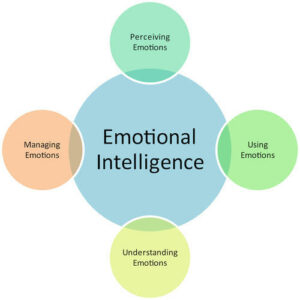
EFT is built on the idea that our emotions play a central role in our lives. And that unresolved emotional issues can lead to psychological distress. Thus, the goal of EFT is to help people become more aware of their emotions. As well as learn how to manage them healthily.
Hence, the therapist will also help the client to identify and manage their emotions more positively. Now, this includes teaching the client techniques for coping with difficult emotions. Such as anger, sadness, and fear.
History And Development
EFT was developed in the 1980s by psychologists Leslie Greenberg and Jeremy Safran. It’s based on several different theories. Such as Gestalt therapy, object relations theory, and attachment theory.
Unfolding Emotion-focused Therapy
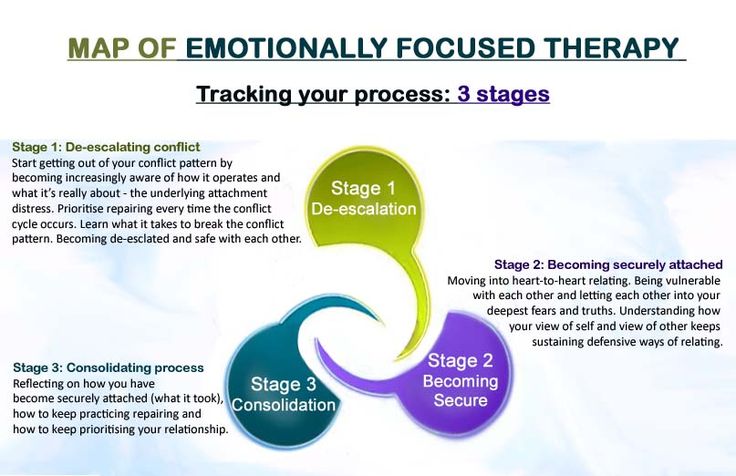
Issues That It Address
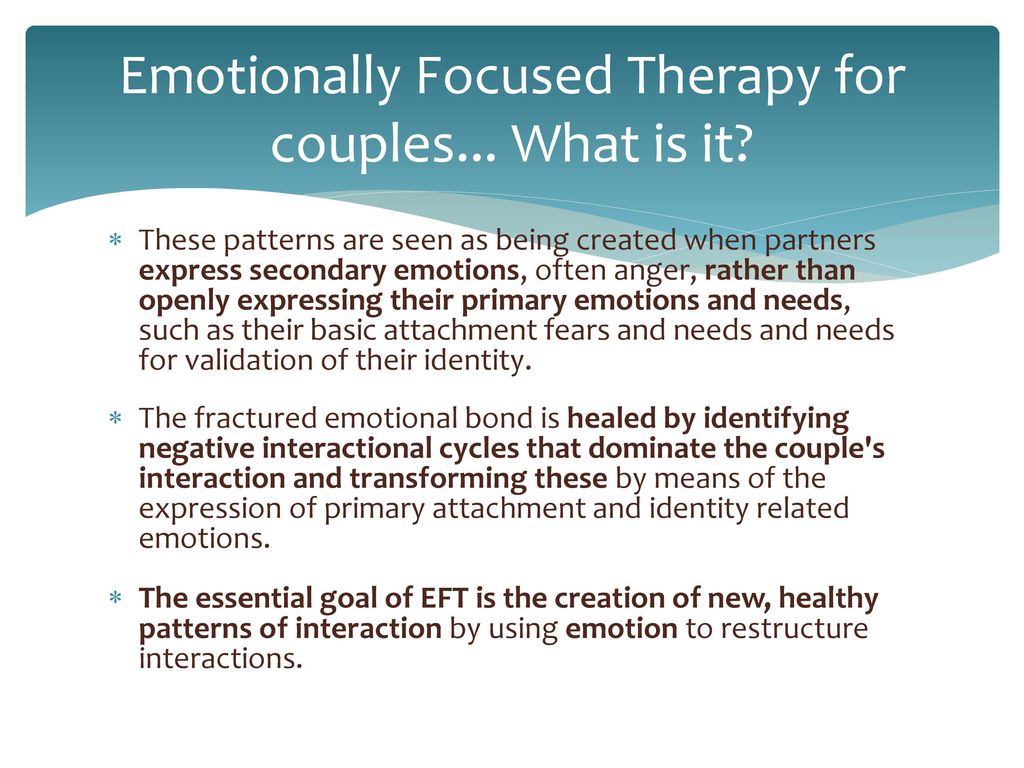
EFT can help address a range of issues. For instance:
- Mental Health Problems: EFT is effective in treating a variety of mental health conditions. Such as anxiety, depression, post-traumatic stress disorder (PTSD), and substance abuse.
- Relationship Issues: EFT can also help people who are struggling with relationship issues or grief.
- Grief: Grief is the emotional response to loss. It can be caused by the death of a loved one, divorce, or the loss of a job.
- Substance Abuse: Substance abuse is the use of drugs or alcohol to cope with difficult emotions.
How Does It Work
The therapist uses a variety of techniques to help the client identify, express, and process their emotions. For instance, these techniques include reflection, role-playing, journaling.
- Reflection: The therapist will often ask the client to reflect on their experiences to gain a better understanding of their emotions.
- Role-playing: In role-playing, the therapist will ask the client to assume different roles to explore their relationships with others.
- Journaling: The therapist may ask the client to keep a journal of their thoughts and feelings. This can help the client track their progress over time.
Evaluating Emotion-focused Therapy
EFT is an effective treatment for a variety of mental health conditions. Moreover, studies have shown that it can help reduce symptoms of anxiety, depression, and PTSD. Also, it can help people who are struggling with relationship issues or grief.
Benefits of Emotion-focused Therapy
Some of the benefits of emotion-focused therapy include:
- improved self-awareness
- better communication skills
- increased empathy for others
- reduced psychological distress
Limitations of Emotion-focused Therapy
There are a few limitations to consider with emotion-focused therapy. For instance:
- It can be expensive, especially if you’re paying out-of-pocket.
- It can take a lot of time and effort to see results.
- Not everyone responds well to this type of therapy.
Why Consider It
If you’re struggling with mental health issues or relationship problems, EFT might be worth considering. It can help treat a variety of conditions. Also, it can help you develop better communication and coping skills. So, if you’re unsure whether EFT is right for you, talk to your doctor or therapist. As they can help you decide if this type of therapy is the right fit for you.
Finding an EFT Therapist
EFT is provided by licensed therapists who have been trained in this type of therapy.
How To Find One
If you’re looking for a therapist who specializes in emotion-focused therapy, there are a few ways to find one. For instance, you can:
- talk to your doctor or therapist
- search the American Psychological Association’s directory of mental health professionals
- visit the website of the Association for Contextual Behavioral Science, which has a directory of EFT therapists
What To Look Out For
When you’re looking for a therapist who provides EFT, there are a few things to look out for. For instance:
- Make sure the therapist has a license and has training in this type of therapy.
- You should also ask about the therapist’s experience treating the specific issue you’re struggling with.
- Finally, be sure to ask about the therapist’s approach to EFT. This will help you make sure that the therapist is a good fit for you.
Red Flag To Avoid
If a therapist tries to tell you that your relationship is the root of all your problems, or that you need to change in order to make the relationship work, this is a red flag. Emotionally focused therapy is not about changing who you are, but rather about understanding and resolving the emotional difficulties that may be affecting your relationship. Furthermore, if a therapist is pressuring you to change, it may be time to find a new one.
Pursuing Training In EFT
If you are interested in becoming an emotionally focused therapist, you will need to complete extensive training. As this type of therapy is not currently recognized as a specialty by the American Psychological Association (APA).
This means there is no specific route to becoming an EFT therapist. However, many therapists who practice this type of therapy have completed post-doctoral programs or have undergone specific EFT training.
Furthermore, the International Centre for Excellence in Emotionally Focused Therapy (ICEEFT) offers an extensive training program in EFT. The ICEEFT program includes both didactic and experiential components and focuses on the development of both personal and professional skills.
Moreover, for becoming an emotionally focused therapist, it is important to research programs carefully and choose one that will best fit your needs. Furthermore, therapists who have undergone training in EFT report high levels of satisfaction with their career choice. And many find that this type of therapy is personally enriching as well as professionally rewarding.
NOTE: We invite you to list yourself on Therapy Mantra’s EFT Therapist Directory.
Hearing From Experts
“EFT is a powerful tool for helping people heal from trauma and other emotional issues. It can be very effective in treating conditions like anxiety, depression, and PTSD.” -Dr. John Moore, Licensed Clinical Psychologist
“EFT is a great option for people who are struggling with mental health issues. It can help you develop better communication and coping skills.” -Dr. Sarah Allen, Licensed Clinical Psychologist
Case Study
Sherry had been struggling with anxiety and depression for years. She had tried a variety of medications and therapy treatments. But nothing seemed to help. Then, his doctor gave him a reference to an EFT therapist. Subsequently, after a few sessions, she started to notice a difference in how she felt. Now, she was less anxious and more able to cope with stress.
Resources
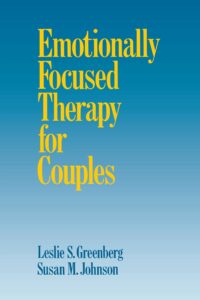
If you have an interest in learning more about emotion-focused therapy; here are a few resources to check out:
- The Association for Contextual Behavioral Science has a directory of EFT therapists.
- The American Psychological Association’s website has information on different types of therapy, including EFT.
Conclusion
EFT is a type of therapy that can help treat mental health issues and relationship problems. Since research and studies show that it is effective in treating a variety of conditions. And it can help you develop better communication and coping skills. So if you have an interest in trying EFT, talk to your doctor or therapist. As they can refer you to a therapist who specializes in this type of therapy.
A Word From Therapy Mantra
Your mental health — Your psychological, emotional, and social well-being — has an impact on every aspect of your life. Positive mental health essentially allows you to effectively deal with life’s everyday challenges.
At TherapyMantra, we have a team of therapists who provide affordable online therapy to assist you with issues such as depression, anxiety, stress, workplace Issues, addiction, relationship, OCD, LGBTQ, and PTSD. You can book a free therapy or download our free Android or iOS app.
